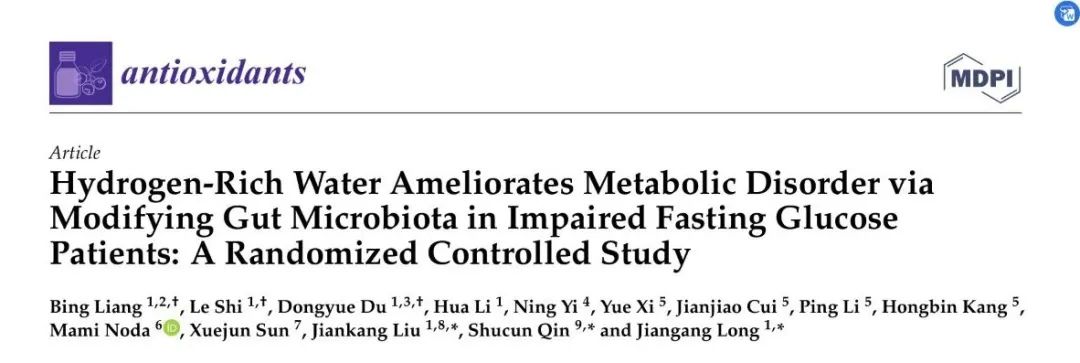Clinical Trial of Hydrogen Rich Water in The Treatment of Diabetes
Recently, a clinical study on hydrogen molecules conducted by Professor Long Jiangan's team at Xi'an Jiaotong University investigated the effects of hydrogen-rich water on glucose and lipid metabolism regulation in patients with impaired fasting glucose (IFG). The study, entitled "A Randomized Double-Blind Controlled Clinical Trial: Hydrogen-Rich Water Improves Metabolic Disorders in Impaired Fasting Glucose Patients by Regulating Intestinal Microbial Communities," was published in the journal Antioxidants.

IFG refers to patients with fasting blood glucose levels higher than normal but not yet at the level of diabetes. Every year, 5%-8% of these individuals gradually develop into type 2 diabetes, and the risk of cardiovascular and cerebrovascular disease also increases significantly. According to the 2021 IDF Global Diabetes Map (10th edition) released by the International Diabetes Federation in December 2021, there are approximately 27 million people in China (aged 20-79) with IFG, accounting for 2.2% of the population. This is a major challenge for the population and health field in China.
Based on previous animal experiments on hydrogen molecules' improvement effects on glucose and lipid metabolism, this clinical study was designed as a double-blind trial to observe the effects of hydrogen molecules. The study was organized by Dr. Liang Bing, Associate Professor Shi Le, and Master Du Dongyue from Professor Long Jiangan's team, in cooperation with multiple hydrogen molecule research teams at home and abroad, including Professor Sun Xuejun from Naval Medical University, Professor Liu Jiankang from Xi'an Jiaotong University, Professor Qin Shucun from Shandong First Medical University, and Professor Mami Noda from Kyushu University in Japan.
The clinical study collected 100 cases of IFG according to Chinese and WHO standards, and provided hydrogen-rich water intervention to explore the effects of hydrogen molecules on glucose metabolism, lipid metabolism, and amino acid metabolism in IFG patients. The subjects were randomly assigned to drink 1000 mL/day of hydrogen-rich water (HRW, hydrogen concentration of 1.4 mg/L) or placebo pure water, and the intervention lasted for 8 weeks. The study used a randomized double-blind method to ensure the reliability of the results.
The study found that giving HRW can significantly reduce fasting blood glucose levels in IFG patients, with an effective rate of 68.8% (the mean fasting blood glucose level decreased from 6.3±0.19 mmol/L at baseline to 5.7±0.42 mmol/L after the intervention). HRW also had a significant alleviating effect on the concurrent fatty liver in IFG patients, with an effective rate of 62.5%. The results of the intestinal microbiota research showed that after giving HRW, the disorder of intestinal microbiota in IFG patients improved, and the changes in the microbiota were highly correlated with nine serum glucose metabolism markers, suggesting that hydrogen molecules participate in metabolic regulation through the intestinal microbiota.
This study conducted a double-blind clinical trial on 100 participants with IFG, a major risk factor for chronic diseases, for a duration of 8 weeks. The study yielded reliable human trial data on the effects of hydrogen molecules. It is believed that by strengthening clinical research on hydrogen molecules, it will effectively promote research on hydrogen molecular biology and medicine in China and provide sufficient evidence for the clinical application of hydrogen molecules.
First author of the article: Liang Bing, Shi Le, Du Dongyue
Corresponding authors of the article: Long Jiangang, Qin Shucun, Liu Jiankang
Liang B, Shi L, Du D, Li H, Yi N, Xi Y, Cui J, Li P, Kang H, Noda M, Sun X, Liu J, Qin S, Long J. Hydrogen-Rich Water Ameliorates Metabolic Disorder via Modifying Gut Microbiota in Impaired Fasting Glucose Patients: A Randomized Controlled Study. Antioxidants (Basel). 2023 Jun 9;12(6):1245. doi: 10.3390/antiox12061245. PMID: 37371975; PMCID: PMC10295603.
